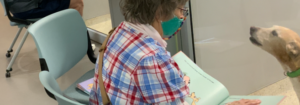Aphasia Communication Tips

Back to physical health resource hub
June is National Aphasia Awareness Month. Over 2.5 million people in the U.S. have aphasia and only 7% of the population even know what it is. Aphasia is a language disorder that affects your ability to understand, read, write or use language. It does not affect intelligence. Aphasia affects relationships, conversation and doing what you love to do. People may lose their job and friends when they cannot talk. “People need to know about aphasia. It is so devastating when you cannot talk and the words are trapped in your head. No one told me what was wrong,” said Joe, a Brooks Rehabilitation Aphasia Center (BRAC) member.
The BRAC provides comprehensive support for people affected by aphasia due to stroke, traumatic brain injury, brain tumors or other neurological disorders. The BRAC offers two programs, including a community track and an intensive, comprehensive aphasia program. The community track provides coordinated group activities to help reduce barriers to communication. The intensive, comprehensive aphasia program combines individual therapy and immersive group rehabilitation for 25–30 hours per week for six weeks.
Communication Tips
Jodi Morgan, CCC-SLP, manager of the BRAC, asked the members what they would like others to know when communicating with someone with aphasia. “The most important thing is to really slow down with people with aphasia and repeat what you say,” stated Mary, one of the members at the BRAC. Amber wrote out, “Say one thing at a time. Not two things. WAIT.” Here are some additional tips from members:
- Slow down
- Say one thing at a time
- Use pen and paper
- Ask what helps
- Draw pictures
- Relax. Be natural
- Don’t pretend you understand
- Write key words
- Reduce background noise
- Verify and check you both understand
“Our dedicated and passionate members work hard to educate others. They mailed and handed out car magnets. They developed communication tip sheets and information for people in the community. They designed face masks about aphasia. They decided that even though aphasia is so hard, they want to present and teach others about aphasia,” said Morgan.
The BRAC members are hosting an in-service where they will share the top ten tips to help people with aphasia as outlined above. They have practiced for weeks and hope people learn and use communication tips. The want their friends, family, doctors and nurses to use these strategies. The in-service is free and will be held June 21 at 10:30 and June 22 at 1pm via zoom.
For more information on aphasia, the zoom education opportunities, aphasia groups, intensive comprehension programs contact us @ (904) 345-6780 or visit our Aphasia Center page.


